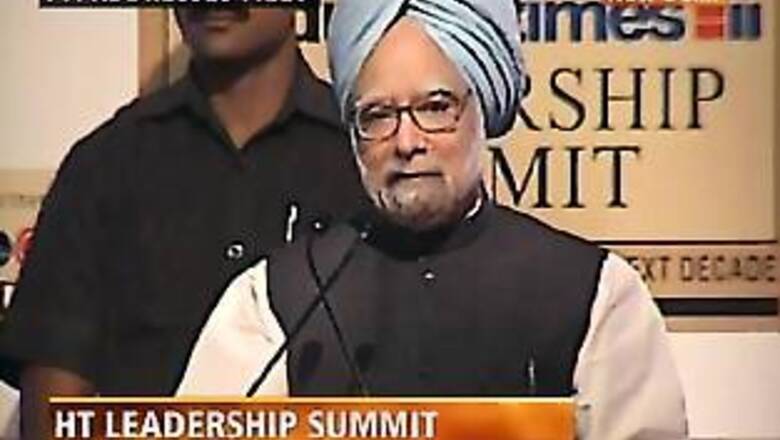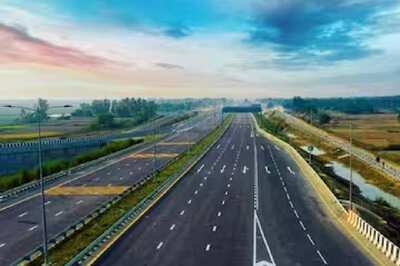
views
New Delhi: Prime Minister Manmohan Singh said on Friday that the Central Government needs "active cooperation" of the state governments to enforce law and order in various parts of the country.
Manmohan Singh's remarks came two days after a Delhi-bound train was hijacked by Maoist guerrillas in West Bengal, demanding release of their leader Chhattradhar Mahato.
"We are a democracy. Also there are occasions when there are differences of opinion among leaders in our own coalition. Law and order is primary responsibility of every civilised state and whatever comes in the way of maintenance and enforcement of law and order will be dealt as it is ought to be dealt with," Manmohan Singh said at the Hindustan Times Leadership Summit being held in the Capital.
The Prime Minister was replying to a question on Railway Minister Mamata Banerjee's "support" to Maoists following the hijacking of the Delhi-bound Rajdhani Express complicated the Central Government's approach in dealing with the Maoist menace.
"India of tomorrow cannot be built from New Delhi alone. We need active cooperation of state governments and that applies not only to developmental process but also enforcement of law and order. We will work with all state governments regardless of their political complexion to strengthen process of law and order," Manmohan Singh said.
The Communist Party of India-Marxist (CPI-M) had on Thursday asked Manmohan Singh to probe the "support" given by Trinamool Congress ministers to Maoist rebels in West Bengal.
The CPI-M had alleged a conspiracy behind the train hold-up in West Midnapore, referring to the hours-long blockade of the Bhubaneswar-Delhi Rajdhani Express.
Peace With Pakistan
India and its neighbours need to "overcome the burden of history" to achieve peace, Prime Minister Manmohan Singh said and added that he wished success to Islamabad in its fight against terror.
Manmohan Singh expressed the hope that democracy would take deeper roots in all the neighbouring countries.
"I think Pakistan is grappling with many internal problems... terrorism is one of them and I wish them success in that. And without going into greater details, I would like to say that as I mentioned yesterday (Thursday) and day before yesterday the destinies of our two countries, and indeed the destinies of all countries of South Asia are closely interlinked," said Manmohan Singh.
Stressing that India sought good relations with all its neighbours, the Prime Minister said: "We sincerely wish to resolve all outstanding issues with our neighbours through dialogue... that should characterise our relations."
His comments comes two days after he offered Pakistan a "hand of friendship" in the Kashmir Valley.
"There are difficulties in expanding areas of cooperation, but they have to be overcome. And I believe it is for the leadership of all countries to make the future happen," said Manmohan Singh.
Earlier, in his inaugural address he said without naming Pakistan that India and its neighbours need to "overcome the burden of history" to achieve peace.
"We need to overcome burden of history and we would like to achieve peace with them. We wish to see democracy take deep roots in all the (neighbouring) countries� We must not allow our past to limit our future," said Singh.
Underlining India's desire to resolve all issues with its neighbouring countries through dialogue, Manmohan Singh said that India was seeking good relations with each one of them.
"We (want) to live in peace with our neighbours and world at large. We wish to remain good neighbours and good global citizens. We seek good relations with each one of them (neighbouring countries)...We sincerely believe to resolve all our outstanding issues with our neighbours through dialogue... and that should characterise our relations," the Prime Minister added.
Rural Development
He also said that India needed to push forward the reform process. Responding to a query by retired bureaucrat N K Singh, Manmohan Singh said the reform process had many dimensions.
He stated that there had to be emphasis on rural infrastructure and emphasis on education.
"We have to create an environment conducive for growth of entrerpreneurship, we must ensure Government involvement in rural development," he added. He also said that rural areas must get the benefit of health and education.
"Our concern is to strengthen primary healthcare in rural areas. I hoped health insurance becomes a viable instrument for providing healthcare for all, including the poor," he added.
He also said the opening day of the summit coincided with the 100th birth anniversary of the "great Indian scientist" Homi J Bhabha. He added that in "concluding the civil nuclear agreement", we sought to realise "Bhabha's dream".

















Comments
0 comment